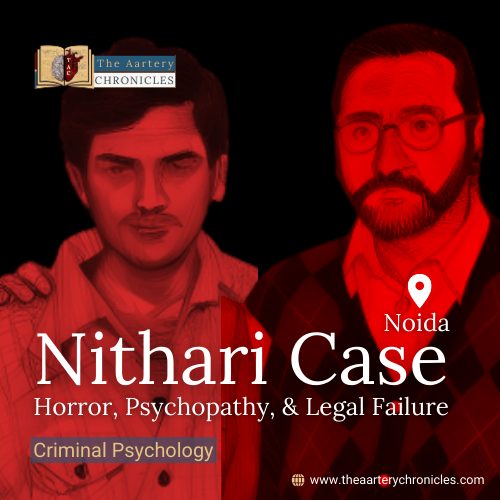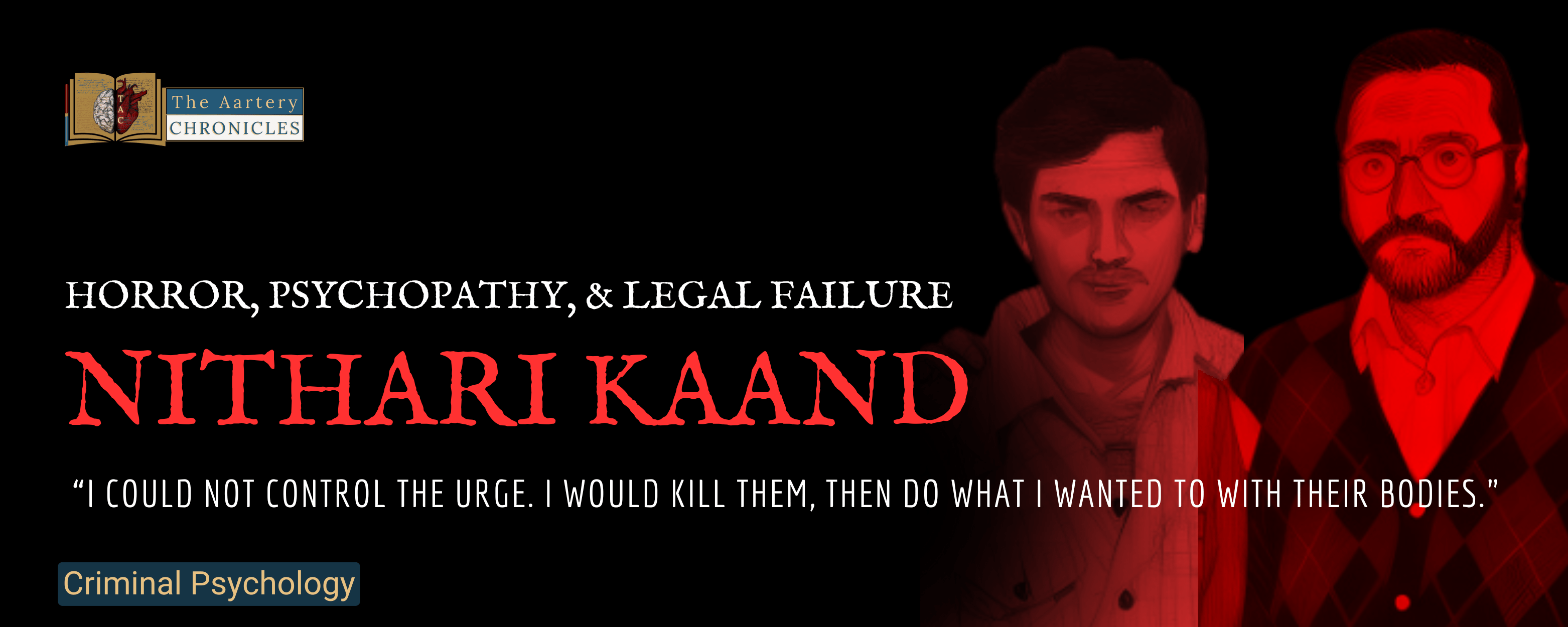

The Nithari Kaand: Horror, Psychopathy, and Legal Failure
In 2006, India was shaken by the gruesome discovery of human remains in Nithari, a small locality in Noida, Uttar Pradesh. What began as a few missing children reports evolved into one of the country’s most gruesome and chilling serial murder cases. More than a dozen children and women were found murdered near the bungalow of Moninder Singh Pandher, a wealthy businessman, and his domestic servant, Surinder Koli. This case, known as the Nithari Kaand, uncovered not only the monstrous acts committed but also deep-rooted societal neglect, systemic police failure, and a descent into the dark recesses of the human mind.
The Investigation: Unfolding of Mass Horror
The Nithari case came to light after the residents noticed an alarming number of children disappearing. Most of the missing children belonged to impoverished families, and their disappearances were largely ignored by law enforcement. For months, parents reported the incidents, but the police dismissed these cases as routine runaways. However, one determined father, Anil Gautam, whose daughter Pinki had disappeared, refused to let the matter rest. His persistence led to a break in the case when a search near Pandher’s bungalow uncovered decomposed human remains—bones, skulls, and other body parts.
In December 2006, investigators discovered a mass grave around Pandher’s house, particularly near the drain. The finding sent shockwaves across the country as more remains surfaced, pointing to a horrific serial killing spree. The sheer number of victims, many of whom were children, sparked public outrage, leading to intense pressure on law enforcement to identify the perpetrators.
The police arrested Surinder Koli, Pandher’s domestic servant, who quickly confessed to the murders during interrogation. He detailed how he had lured children into the house, murdered them, and engaged in unspeakable acts such as necrophilia and cannibalism. According to Koli, the murders had been going on for years, while Pandher’s role remained unclear, leading to heated debates.
The Psychological Breakdown of Surinder Koli
Surinder Koli, a figure whose psychological state remains a central focus in understanding the crime. His confession revealed a mind driven by compulsive necrophilia and cannibalism, devoid of any sense of morality or empathy.
"I could not control the urge. I would kill them, then do what I wanted to with their bodies."
I could not control the urge. I would kill them, then do what I wanted to with their bodies."
Koli admitted that he could not control the urge to kill, stating: “I could not control the urge. I would kill them, then do what I wanted to with their bodies.” His acts were more than just murder; they reflected a severe disturbance of mind. Psychologists examining his behaviour classified it under Antisocial Personality Disorder (ASPD), marked by a lack of empathy, remorse, and a consistent violation of others’ rights. Furthermore, his actions fall into the category of Necrophilic Disorder and Cannibalistic Impulse, both of which are indicative of rare and extreme paraphilic disorders.
Clinical Classification of Koli’s Crimes
Surinder Koli’s psychological profile fits within the clinical frameworks of both ICD-11 and DSM-5:
- Antisocial Personality Disorder (ASPD) (ICD-11: 6D11 / DSM-5: 301.7): Characterised by a chronic disregard for others’ rights, impulsive behaviour, and an absence of remorse for harmful actions.
- Necrophilic Disorder: While not explicitly classified in DSM-5, necrophilia is included under Other Specified Paraphilic Disorders, denoting a sexual attraction to corpses. Koli’s post-mortem sexual acts align with this disturbing paraphilia.
- Cannibalistic Impulse: His confession of cooking and consuming parts of his victims’ bodies points to deep-seated psychopathological disturbances, further underscoring his deviant compulsions.
While Koli’s exact psychological diagnosis remains debated, his behaviour indicated a detachment from reality, driven by an uncontrollable urge to kill and defile his victims.
Antisocial Personality Disorder (APD)
DSM-5 Code: 301.7 (Antisocial Personality Disorder)
Definition: A pervasive pattern of disregard for the rights of others, occurring since age 15, as indicated by three or more of the following:
- Failure to conform to social norms regarding lawful behaviour.
- Deceitfulness, as indicated by lying, use of aliases, or conning others.
- Impulsivity or failure to plan.
- Irritability and aggressiveness, as indicated by repeated physical fights or assaults.
- Reckless disregard for the safety of self or others.
- Consistent irresponsibility, as indicated by failure to sustain consistent work behaviour or honour financial obligations.
- Lack of remorse for actions.
ICD-10 Code: F60.2 (Dissocial Personality Disorder)
Definition: A similar condition characterized by a disregard for the feelings and rights of others, with patterns of behaviour including deceitfulness, impulsivity, and lack of remorse.
Necrophilic Disorder:
DSM-5 (Diagnostic and Statistical Manual of Mental Disorders, 5th edition):
- Necrophilia is not explicitly defined as a distinct disorder in the DSM-5, but it is considered under the category of Other Specified Paraphilic Disorder (302.9) when it causes significant distress or impairment. Paraphilic disorders involve recurrent, intense sexually arousing fantasies, urges, or behaviors involving atypical targets (in this case, corpses).
- Necrophilia involves a sexual attraction to corpses, typically fulfilling a deviant sexual compulsion.
ICD-11 (International Classification of Diseases, 11th Revision):
- In the ICD-11, necrophilic tendencies can be classified under Paraphilic Disorders as part of the broader Other Paraphilic Disorders Involving Non-consenting Individuals (6D33). Although necrophilia is not a specific entry, it would fall under this umbrella, particularly because it involves non-consenting bodies (deceased individuals).
- The ICD-11 does not specifically mention necrophilia but considers any sexual interest that involves harm to others (including deceased individuals) as part of this classification.
Cannibalistic Impulses:
DSM-5:
Cannibalism itself is not classified as a mental disorder in the DSM-5, but it can be considered a form of Severe Psychopathic or Paraphilic Behavior, especially when linked to Antisocial Personality Disorder (ASPD) or Other Specified Paraphilic Disorders.
It can also be associated with extreme forms of Delusional Disorder or Schizophrenia when accompanied by psychotic episodes leading to such behaviours.
ICD-11:
Cannibalism would fall under Other Paraphilic Disorders Involving Harm to Others (6D33) if motivated by sexual impulses. In non-sexual cases, it could be linked to Psychotic Disorders (e.g., Schizophrenia or Psychotic Episode) or Antisocial Personality Disorder when driven by extreme violence or a lack of empathy for the victim.
Moninder Singh Pandher: A Controversial Figure
Moninder Singh Pandher, the wealthy businessman who owned the bungalow where the bodies were found, was arrested alongside Koli. His involvement in the murders became a matter of public outrage and legal debate. Koli claimed that Pandher was unaware of the murders, which he committed alone, yet Pandher’s role came under suspicion due to the nature of the crimes committed on his property.
Initially, Pandher was convicted alongside Koli in the Rimpa Haldar case, one of the many cases connected to the Nithari murders. However, his involvement remained controversial, with many questioning whether his wealth and status had shielded him from deeper scrutiny. In 2009, the Allahabad High Court acquitted Pandher in several cases, citing insufficient evidence of his direct involvement. This acquittal sparked a wave of public criticism, with many accusing the legal system of favouring the affluent.
While Koli continued to face multiple death sentences, Pandher was eventually acquitted of most charges, leaving lingering doubts about whether he had been complicit or simply negligent.
The Criminal Trials: Seeking Justice Amid Controversy
The criminal trials of the Nithari Kaand were protracted and riddled with controversy. Both Koli and Pandher were charged with multiple counts of murder, rape, and necrophilia. The judicial process had to proceed one case at a time, given the sheer volume of victims.
Koli’s Convictions: Koli was sentenced to death in multiple cases. His confessions and the overwhelming evidence against him—ranging from witness testimonies to forensic findings—sealed his fate. Despite several appeals, his death sentences were upheld by the Supreme Court, and his petitions for clemency were denied. In 2014, days before his scheduled execution, a stay was granted, sparking a legal battle that continues to this day.
Pandher’s Acquittals: Pandher’s acquittals, particularly in the Rimpa Haldar case, remain a subject of debate. Many viewed the decisions as indicative of the disparities in India’s justice system, where wealth and influence often tilt the scales.
Conclusion: The Legacy of the Nithari Kaand
The Nithari Kaand is more than a tale of horrific violence—it is a mirror reflecting the failures of a system designed to protect the vulnerable. The case exposed how law enforcement ignored the pleas of the marginalised, how societal structures allowed a predator like Koli to operate undetected, and how privilege may have played a role in insulating Moninder Singh Pandher from full accountability.
Psychologically, the case highlights the terrifying depths of deviance found in individuals like Surinder Koli. His actions align with the rarest and most severe psychological disorders, providing a stark reminder of how unchecked impulses can manifest in the darkest ways imaginable. The Nithari case shares parallels with infamous serial killers like Ted Bundy, where outward normalcy concealed deep psychopathic tendencies.
In the end, the Nithari Kaand serves as a chilling reminder of the hidden fractures in the human psyche and the devastating consequences of systemic neglect. It stands as one of India’s most notorious cases, a tragedy that haunts the nation’s collective memory.
Series, articles, and movies related to the Nithari Kaand
Crime Patrol is an Indian crime anthology show that covers the Nithari Kaand in great detail, depicting the horrors of the case.
This is another crime series that detailed the Nithari killings.
Although Talvar primarily revolves around the Aarushi Talwar murder case, it touches on systemic failures in India's criminal justice system, a theme that resonates with the Nithari Kaand.
This true crime docu-series on Hotstar includes an episode that delves into the Nithari murders.
NDTV produced a documentary that chronicled the events of the Nithari killings, featuring interviews with investigators and victim families.
Though not directly about the Nithari Kaand, this series explores India's criminal investigations, providing context to cases like Nithari.
The Nithari Case - A Timeline of Events (India Today):
India Today - Nithari Murders TimelineA Comprehensive Breakdown of the Nithari Killings (The Hindu):
The Hindu - Nithari KillingsNithari Killings: A Grisly Tale (BBC):
BBC - Nithari KillingsCBI's Official Report on Nithari Case:
CBI Nithari Case Report (PDF)

Author:
Dr Darshit Patel, MD General Medicine




